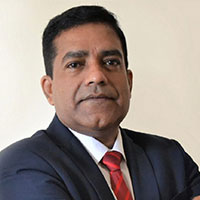Organizations can partner with Cloud Managed Service Providers to manage complexities and exploit capabilities
The Middle East has witnessed a significant surge in cloud adoption, driven by the region’s rapid digital transformation and increasing demand for scalable and efficient IT infrastructure. More companies are embracing hybrid Cloud strategies to extract the best capabilities offered by each environment.
The tenth annual Flexera 2021 State of the Cloud Report, found that 92 percent of enterprises have a multi-cloud strategy with 82% percent enterprises having a hybrid Cloud strategy. The survey comprising 750 technical professionals from around the globe and across verticals found that Cloud adoption had become mainstream with 61% planning to optimize Cloud costs in 2021, making it the top initiative fifth year in a row.
In 2023, the same survey finds the multi-Cloud momentum continues to be strong with 87% respondents embracing multi-Cloud. A large percentage of this is hybrid environment while 15% actually use multiple private Cloud.
The advantages to the multi-cloud are appealing. It allows companies to pick cloud providers for specific specialized functionality. For e.g., AI/ML workloads in a specific cloud provider due to the unique capabilities; and cost management such as leveraging discounts and improving negotiating power across cloud providers.
Nutanix’s Saudi findings from its latest Enterprise Cloud Index (ECI) survey throw up some interesting facts that might represent the larger region. Companies in Saudi Arabia plan to boost their mixed-IT usage to 71% within three years, just a bit short of the expected global levels for the same time frame.
“Multi-cloud adoption is increasing in the Middle East due to organization’s requirement for flexible and scalable cloud solutions that can support their diverse workloads. These organizations are leveraging multiple cloud providers to achieve benefits like redundancy, cost optimization, improved performance, and data sovereignty,” Walid Issa – Senior Manager-Solutions Engineering, MEA at NetApp.

“Outsourcing cloud management to an MSP also enables organizations to benefit from proactive monitoring and maintenance. MSPs have the capability to continuously monitor cloud infrastructure and applications, identifying potential issues and addressing them proactively. This relieves organizations from the burden of day-to-day management, allowing them to focus on core business activities.” Walid Issa- Senior Manager-Solutions Engineering, MEA at NetApp.
But managing cloud deployments presents various challenges, such as scalability, security, and cost optimization. According to ManageEngine report—The state of ITOM in 2023—59% of surveyed organizations stated that the biggest challenge they have with cloud migration is ensuring data privacy, security, and compliance. Maintaining robust security measures to safeguard data and applications requires continuous monitoring and updates, which can be challenging.
Bharani Kumar Kulasekaran, Product Manager at ManageEngine elaborates on the report findings, “Fifty percent of respondents also claimed that understanding application dependencies is a significant challenge with cloud deployments. This refers to understanding and managing the relationships between the components of an application and the resources that they rely on.”

“It’s important to select an MSP with successful track record in managing complex cloud environments. If you plan to use multiple cloud providers, ensure the MSP has experience in managing diverse cloud environments and offers expertise in handling different cloud platforms. Organizations must also ensure that the MSP is willing to commit to performance-based service-level agreements (SLAs).” Bharani Kumar Kulasekaran, Product Manager at ManageEngine
Operational Complexities of Cloud
So, what are some of the complexities that organizations are grappling with. In large-scale Cloud deployments, the pay-as-you-go model can become more expensive compared to traditional environments, primarily due to the complex billing structures and additional costs for data transfers.
“While the pay-as-you-go model offers flexibility and cost savings for variable workloads, it requires careful monitoring to avoid unexpected expenses. CSPs charge for data transfers between services or regions, which can accumulate costs, especially in data-intensive applications,” says Sajith Kumar, Senior Manager at Cloud Box Technologies.

“By having a separate agreement, organizations can focus on the unique security and compliance requirements. This clarity minimizes ambiguity and helps both parties understand the roles and obligations effectively. A separate agreement also enables to prioritize security as a crucial aspect of the overall IT operations, emphasizing its significance in the partnership with the MSP.” Sajith Kumar, Senior Manager at Cloud Box Technologies
Additionally, the modular pricing of cloud services can lead to unforeseen expenses if resources are not efficiently managed. Proper cost optimization strategies, such as resource allocation, usage monitoring, and leveraging discounts, are essential to control costs effectively in large-scale Cloud deployments.
“The biggest complexity is the heterogeneity of your environment and the operational costs of managing that heterogeneity and the security costs of customizing controls for each environment,” says Ely Kahn, VP, Product Management, Cloud Security and AI/ML Products at SentinelOne.
According to ManageEngine’s Kulasekaran, “A potential roadblock to adopting an effective cloud migration strategy is that with large-scale cloud deployments, the increase in complexity can lead to higher costs, especially with pay-as-you-go models. Without the right strategy, these challenges can be difficult to navigate.”
“Managing a hybrid/multi-cloud environment presents with various technical and operational complexities. One of the primary challenges is the integration of different cloud platforms, including public, private, and on-premises infrastructure. This integration requires careful consideration to ensure smooth communication, data synchronization, and interoperability between these diverse environments,” says Issa of NetApp.
Managing multiple cloud providers can be complex and requires specific Cloud skills. This can result in increased costs, time, and resources needed to manage and maintain multi-cloud environments. “Managing multiple clouds can be complex, as each cloud provider has its own unique set of APIs, tools, and terminology. This can make it difficult to get a clear understanding of what is running across all the clouds, and to troubleshoot problems,” says Cloud Box’s Kumar.
Security and compliance are critical considerations in cloud management. There are complexities in effective data management across multiple clouds. Organizations must address concerns such as data movement, data protection, and data governance to ensure compliance and security while maximizing the value of their data assets.
“The complexity of managing security across multiple clouds makes it difficult for organizations to gain a complete view of their security posture, leaving them vulnerable to attack,” says Muath AlHomoud, Executive Director, Cyber Security, D360 Bank.

“The complexity of managing security across multiple clouds makes it difficult for organizations to gain a complete view of their security posture, leaving them vulnerable to attack.” Muath AlHomoud, Executive Director, Cyber Security, D360 Bank
“Organizations must implement controls across identity and access management, infrastructure protection, data protection, application security, detection, and incident response. Many of these controls are similar to the on-premises world, but with some important differences. For example, with public cloud deployments misconfigurations can lead to a company’s cloud resources being directly accessible from the public internet, which remains a top cause of cloud incidents,” says SentinelOne’s Ely Kahn.

“Organizations must implement controls across identity and access management, infrastructure protection, data protection, application security, detection, and incident response. Many of these controls are similar to the on-premises world, but with some important differences. For example, with public cloud deployments misconfigurations can lead to a company’s cloud resources being directly accessible from the public internet, which remains a top cause of cloud incidents.” Ely Kahn, VP, Product Management, Cloud Security and AI/ML Products at SentinelOne
Furthermore, operational complexities arise from the need to manage diverse cloud vendor relationships, service-level agreements (SLAs), and billing structures. Each cloud provider may have different performance characteristics, pricing models, and management tools, which necessitates careful evaluation and decision-making.
“To determine the optimum cloud mix in an organizational strategy, it is crucial to conduct a comprehensive assessment of business requirements, workload characteristics, regulatory compliance needs, cost considerations, and scalability requirements,” says Issa.
The Value of Managed Service Providers
Many organizations are managing Cloud complexities with the help of Managed Service Providers (MSP). One of the key benefits is the expertise and guidance MSP offers with specialized knowledge and experience in cloud technologies and best practices MSPs provide valuable insights and advice on cloud strategy, architecture design, and implementation. This enables organizations to make informed decisions and optimize the cloud environments for maximum efficiency and effectiveness.
“Outsourcing cloud management to an MSP also enables organizations to benefit from proactive monitoring and maintenance. MSPs have the capability to continuously monitor cloud infrastructure and applications, identifying potential issues and addressing them proactively. They perform regular maintenance tasks, ensure optimal performance and availability of cloud resources. This relieves organizations from the burden of day-to-day management, allowing them to focus on core business activities,” says Issa.
Selecting an MSP aligned with organizational needs is crucial to have a successful partnership. Organizations must consider the experience and expertise in areas such as security, 24/7 support, data backup, migration experience, transparency, and communication. An ideal MSP should have experience in managing relevant cloud platforms, emphasise robust security and offer tailored services to suit needs. They should efficiently scale resources, provide round-the-clock monitoring and offer robust disaster recovery plans.
“It’s important to select an MSP with successful track record in managing complex cloud environments. If you plan to use multiple cloud providers, ensure the MSP has experience in managing diverse cloud environments and offers expertise in handling different cloud platforms. Organizations must also ensure that the MSP is willing to commit to performance-based service-level agreements (SLAs),” says Kulasekaran.
SLAs must be designed properly to ensure the responsibility for performance rests with the MSP. Organizations can ensure those commitments are met and impose fines or other consequences when they are not.
Extracting the Best of Cloud
As organizations in the Middle East embark on cloud journey, data security and compliance concerns, network connectivity issues, and cost optimization are key challenges in managing cloud operations.
MSPs alleviate the burden of day-to-day operational tasks, enabling internal teams to focus on core business objectives. They bring specialized skills in cloud technologies and best practices, ensuring the organization’s cloud infrastructure remains secure, reliable, and optimized.
Several operations can be streamlined by outsourcing to MSPs. They can continuously monitor cloud resources and application performance, identifying bottlenecks and inefficiencies, and implementing optimizations for improved performance.
When evaluating a Managed Cloud Service Provider (MCSP), it is important to consider capabilities and strong understanding of various cloud platforms such as AWS, Azure, or Google Cloud. The MCSP should have certified professionals who possess in-depth knowledge of cloud services, architecture design, and implementation best practices.
Having a separate agreement for managed security services is generally a good idea. This allows organizations to clearly define the scope, responsibilities, and expectations related to security management. A dedicated agreement ensures that specific security-related services are outlined distinctly from other managed services, emphasizing the critical nature of cybersecurity.
“By having a separate agreement, organizations can focus on the unique security requirements, compliance measures. This clarity minimizes ambiguity and helps both parties understand their roles and obligations effectively. A separate agreement also enables organizations to prioritize security as a crucial aspect of the overall IT operations, emphasizing its significance in the partnership with the MSP,” says Cloud Box’s Kumar.
To ensure the partnership remains aligned with business goals, regular business reviews and strategic planning sessions should be conducted. These sessions allow the organization and MSP to evaluate the cloud strategy, assess performance against business objectives, and identify opportunities for optimization and growth. Proactive communication and collaboration are vital, enabling the MSP to understand evolving business needs and provide recommendations for leveraging cloud technologies effectively.
Partnering with MSPs can help Middle Eastern companies to overcome the challenges of managing Cloud complexities and fully capitalize the, empowering them to drive innovation, improve operational efficiency and remain competitive in the rapidly evolving digital landscape.


